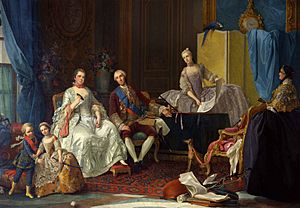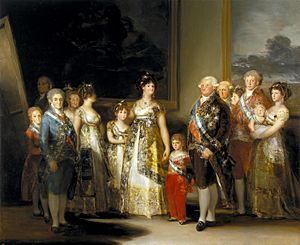Maria Luisa of Parma facts for kids
Quick facts for kids Maria Luisa of Parma |
|||||
|---|---|---|---|---|---|
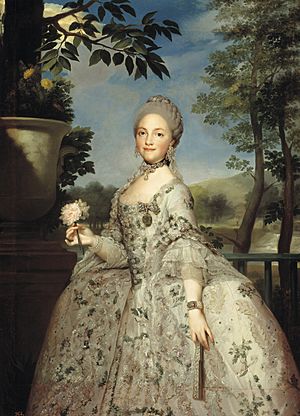
Portrait by Anton Raphael Mengs, 1765 as Princess of Asturias
|
|||||
| Queen consort of Spain | |||||
| Reign | 14 December 1788 - 19 March 1808 | ||||
| Born | 9 December 1751 Parma, Duchy of Parma |
||||
| Died | 2 January 1819 (aged 67) Palazzo Barberini, Rome, Papal States |
||||
| Burial | El Escorial | ||||
| Spouse | |||||
| Issue Detail |
|
||||
|
|||||
| House | Bourbon-Parma | ||||
| Father | Philip, Duke of Parma | ||||
| Mother | Louise Élisabeth of France | ||||
| Religion | Roman Catholicism | ||||
Maria Luisa of Parma (born Luisa Maria Teresa Anna; 9 December 1751 – 2 January 1819) was a Spanish queen. She became the Queen of Spain when she married Charles IV of Spain. Her time as queen lasted from 1788 to 1808, just before the Peninsular War. She was known for her strong personality and her interest in government matters.
Contents
Life of Queen Maria Luisa
Early Life and Family Background
Maria Luisa was born in Parma on December 9, 1751. She was the youngest daughter of Philip, Duke of Parma. Her father was the fourth son of Philip V of Spain. Her mother was Louise Élisabeth of France, the oldest daughter of King Louis XV of France.
She was named Luisa María Teresa Ana after her grandparents and her mother's favorite sister. However, she is best known by the shorter Spanish name, María Luisa.
Her parents became the Duke and Duchess of Parma in 1749. This happened after the Treaty of Aix-la-Chapelle (1748) gave the duchy to the Bourbon family.
Maria Luisa, her brother Ferdinand, and her sister Isabella were said to have been taught by Étienne Bonnot de Condillac. He was a famous French philosopher.
Becoming Princess of Asturias
Maria Luisa's mother wanted her to marry Louis, Duke of Burgundy. He was the heir to the French throne. But the young duke died in 1761.
In 1762, Maria Luisa became engaged to her cousin Charles. He was the Prince of Asturias, which meant he was the heir to the Spanish throne. He later became King Charles IV of Spain.
Her older sister Isabella died in 1763. There were ideas for Maria Luisa to marry Isabella's husband, Emperor Joseph II. But this idea was turned down. Her engagement to Charles of Asturias was confirmed.
The wedding took place on September 4, 1765, at La Granja Palace.
Her husband, Charles, was the son of Charles III of Spain. This made Maria Luisa the Princess of Asturias, or crown princess. At that time, there was no queen in Spain. So, Maria Luisa became the most important lady at court. This happened after the Queen Mother, Queen Isabel de Farnesio, died a few months later.
Maria Luisa was described as smart and determined. She was also seen as attractive when she got married. She was known for her elegant style and love for fancy clothes and jewelry.
Her father-in-law, King Charles III, thought she was too focused on fun. He tried to watch over her private life and limit her freedom. But he didn't have much success.
Her relationship with Charles was good. She was seen as the stronger partner in their marriage. She became a key figure among those who wanted to influence the future king.
Reign as Queen of Spain
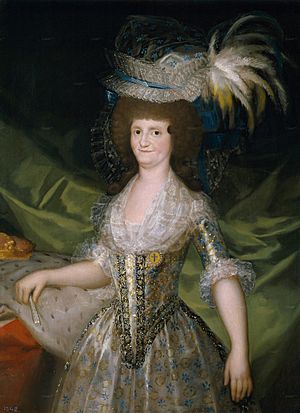
In 1788, her husband became King Charles IV of Spain. This made Maria Luisa the Queen. From the very first meeting between Charles IV and his ministers, Maria Luisa was there. This was unusual and became a regular practice during her husband's rule.
Since she was the dominant partner in the marriage, Maria Luisa had a lot of influence over Charles IV and the government. She was also believed to be strongly influenced by the prime minister, Manuel de Godoy.
Maria Luisa was very interested in music and art. She was known for supporting artists, especially Francisco Goya.
The Queen's strong influence, combined with the prime minister's policies, made her unpopular. People were unhappy about a treaty with France that allowed French troops in Spain. At one point, a crowd threatened the Queen, and her guards had to protect her. In 1808, public anger over the French policy led to an uprising in Aranjuez.
Life After the Throne
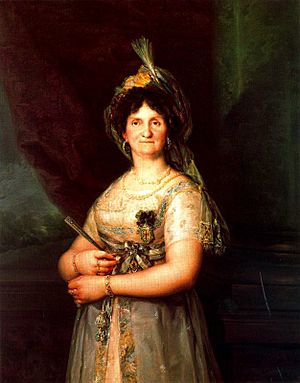
On March 19, 1808, Charles IV gave up his throne. This was due to pressure from Napoleon I. In April 1808, Maria Luisa went with Charles IV and Manuel Godoy to meet Napoleon in France. They hoped Napoleon would help her husband get the Spanish throne back from their son, Ferdinand VII. Their son also attended the meeting.
However, at the meeting, Napoleon forced both Charles IV and Ferdinand VII to give up their claims to the throne. Napoleon then declared his brother, Joseph Bonaparte, as the new king of Spain. When Napoleon's army invaded Spain, some writings blamed Maria Luisa for the king's decision to step down.
After giving up the throne, Maria Luisa lived with Charles IV and Manuel Godoy in France. They were like state prisoners of Napoleon. They first lived in Compiègne and Aix-en-Provence. Later, they were allowed to move to Marseille, where they stayed for four years. In 1812, they were allowed to live in the Barberini Palace in Rome, under the Pope's protection.
After Napoleon's defeat in 1814, her son Ferdinand VII became King of Spain again. But he did not allow his parents or Godoy to return to Spain. When Napoleon briefly returned to power in France in 1815, Maria Luisa, Charles, and Godoy went to France. After Napoleon's final defeat, they returned to Rome and lived there permanently.
While in Rome, Maria Luisa and Charles built a large art collection. It included paintings by famous artists like Titian, Correggio, and Tintoretto. This collection was later moved to Madrid.
Both Maria Luisa and her husband died in Italy in early 1819. Maria Luisa reportedly died from a lung illness.
In her will, Maria Luisa named Manuel Godoy as her main heir. She stated that he had shared their time in exile and lost his own property because of it.
Legacy
In 1792, the Order of Queen Maria Luisa was created. This special order for women was founded based on her idea.
Issue
Maria Luisa married her first cousin Charles IV in 1765. She had 24 pregnancies. From these, she had 10 miscarriages and 14 children were born. Seven of her children lived to adulthood.
| Name | Portrait | Lifespan | Notes |
|---|---|---|---|
| Carlos Clemente Infante of Spain |
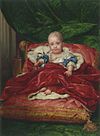 |
19 September 1771 – 7 March 1774 |
Born and died at El Escorial. He was baptized on the day he was born. Pope Clement XIV celebrated Carlos' birth and sent special clothes for the baby. |
| Carlota Joaquina Queen of Portugal and the Algarves |
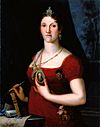 |
25 April 1775 – 7 January 1830 |
Born at the Royal Palace of Aranjuez. She married John VI of Portugal in 1785. She became Queen consort of Portugal in 1816. She had children, including the future Pedro I of Brazil. She died at Queluz National Palace. |
| Maria Luisa Infanta of Spain |
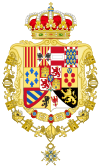 |
11 September 1777 – 2 July 1782 |
Born and died at the Royal Palace of La Granja de San Ildefonso. |
| María Amalia Infanta of Spain |
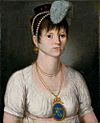 |
9 January 1779 – 22 July 1798 |
Born at the Royal Palace of El Pardo. She married her uncle Infante Antonio Pascual of Spain in 1795. She gave birth to a stillborn son in 1798 and died soon after. |
| Carlos Domingo Infante of Spain |
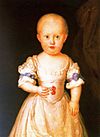 |
5 March 1780 – 11 June 1783 |
Born at the Royal Palace of El Pardo and died at the Royal Palace of Aranjuez. After his birth, his father pardoned all convicts from Puerto San Julián as a celebration. |
| Maria Luisa Queen of Etruria Duchess of Lucca |
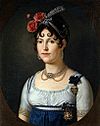 |
6 July 1782 – 13 March 1824 |
Born at the Royal Palace of La Granja de San Ildefonso. She married Louis, King of Etruria in 1795 and had children, including Charles II, Duke of Parma. She became Duchess of Lucca in 1817. She died in Rome in 1824 from cancer. |
| Carlos Francisco de Paula Infante of Spain |
 |
5 September 1783 – 11 November 1784 |
Twins, born and died at the Royal Palace of La Granja de San Ildefonso. Their birth was important for Spain and seemed to secure the future of the throne. However, both Carlos and Felipe died young. |
| Felipe Francisco de Paula Infante of Spain |
5 September 1783 – 18 October 1784 |
||
| Fernando (VII) King of Spain |
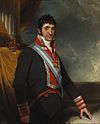 |
14 October 1784 – 29 September 1833 |
Born and died at El Escorial. He became King in 1808 but was removed by Joseph Bonaparte a month later. He married Princess Maria Antonia of Naples and Sicily in 1802 but had no children with her. He became King again in 1813. He married Maria Isabel of Portugal in 1816 and had children. He married Maria Josepha Amalia of Saxony in 1819 but had no children with her. He married Maria Christina of the Two Sicilies in 1829 and had children, including the future Isabel II of Spain. He died in 1833. |
| Carlos María Isidro Benito Count of Molina |
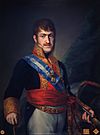 |
29 March 1788 – 10 March 1855 |
Born at the Royal Palace of Aranjuez. He married Infanta Maria Francisca of Portugal in 1816 and had children. He married Maria Teresa, Princess of Beira in 1838 but had no children with her. He was the first Carlist claimant to the Spanish throne as "Carlos V". He used the title "Count of Molina" from 1845 until his death in 1855. |
| María Isabel Queen of the Two Sicilies |
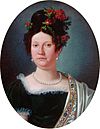 |
6 July 1789 – 13 September 1848 |
Born at the Royal Palace of Madrid. She married Francis I of the Two Sicilies in 1802 and had children, including the future Ferdinand II of the Two Sicilies. She was Queen consort from 1825 to 1830, until her husband's death. She died at the Palace of Portici in 1848. |
| Maria Teresa Infanta of Spain |
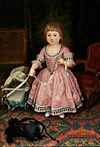 |
16 February 1791 – 2 November 1794 |
Born at the Royal Palace of Aranjuez and died at El Escorial from smallpox. |
| Felipe Maria Infante of Spain |
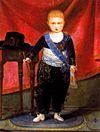 |
28 March 1792 – 1 March 1794 |
Born at the Royal Palace of Aranjuez and died at the Royal Palace of Madrid. |
| Francisco de Paula Duke of Cadiz |
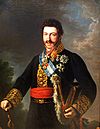 |
10 March 1794 – 13 August 1865 |
Born at the Royal Palace of Aranjuez. He married Princess Luisa Carlotta of Naples and Sicily in 1819 and had children. He died in Madrid in 1865. |
Images for kids
See also
 In Spanish: María Luisa de Parma para niños
In Spanish: María Luisa de Parma para niños
 | James B. Knighten |
 | Azellia White |
 | Willa Brown |


